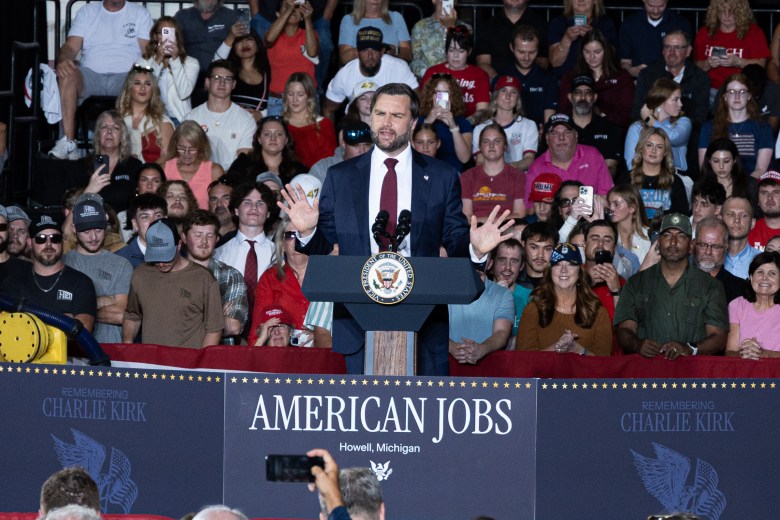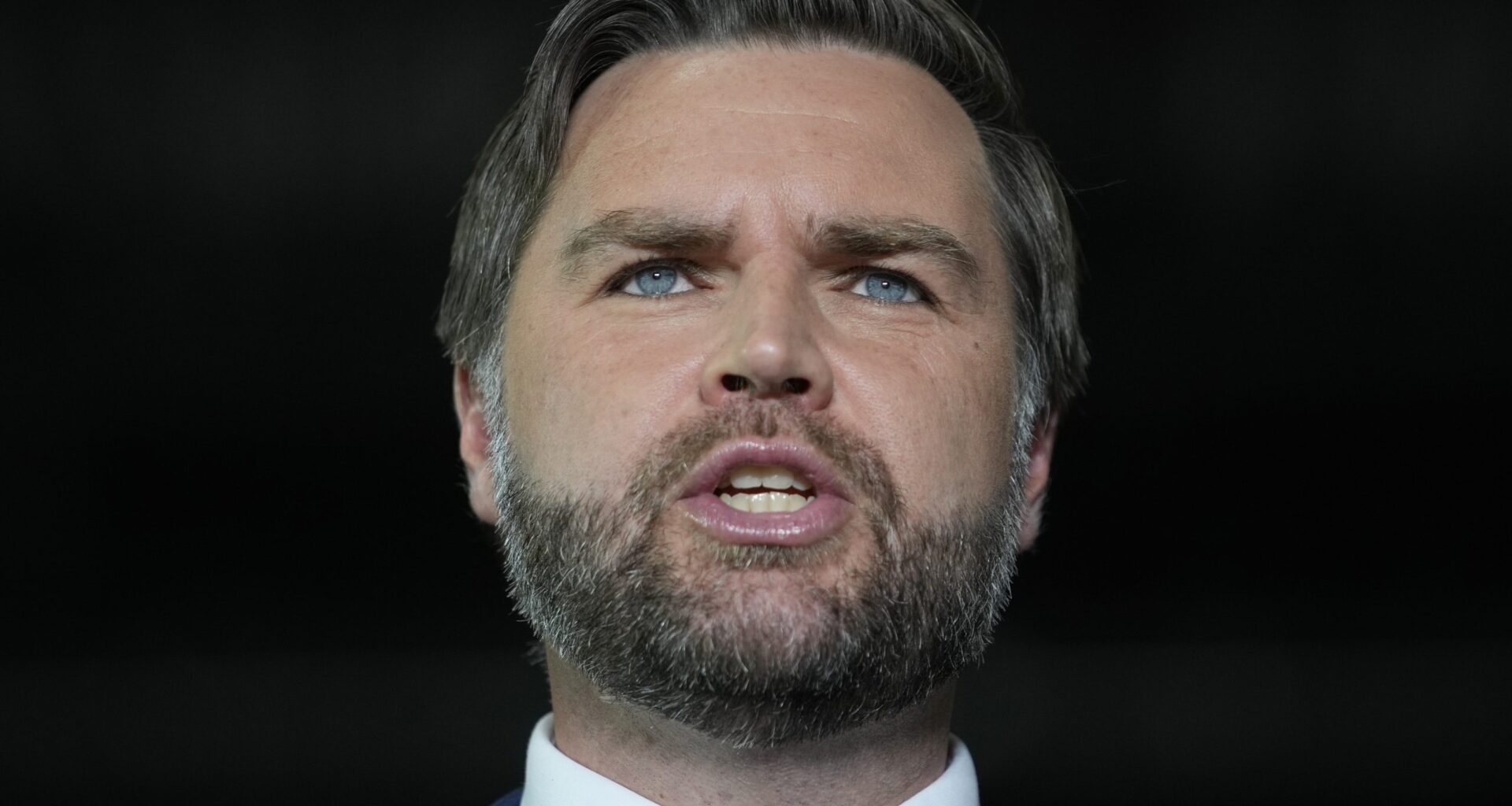Vice President JD Vance offered to send the military into Detroit, Michigan’s largest city, if Gov. Gretchen Whitmer requests it
Vance toured a metal stamping plant in Howell to tout President Donald Trump’s “big, beautiful” tax and spending cut law
Facts were fudged on some key aspects of the new law, including the size of tax cuts and availability of an expanded child tax credit
HOWELL — President Donald Trump’s administration is ready to send National Guard troops to Detroit if Gov. Gretchen Whitmer asks, Vice President JD Vance said Wednesday in a Michigan speech.
Citing “serious crime problems” in Detroit, Vance noted the Republican administration has recently deployed armed forces to Washington, DC, and Memphis, Tennessee, “to take back American streets.”
“Gretchen, we are happy to send the National Guard to Detroit, Michigan,” Vance said in remarks directed at Whitmer. “All you’ve got to do is ask.”
Whitmer’s office did not immediately reply to a request for comment.
While Detroit remains one of the more violent large cities in America, its violent crime rate has fallen in recent years. In 2024, the city recorded the lowest number of murders in nearly 60 years, a milestone marked by Mayor Mike Duggan and aided by Detroit’s smaller population.
It’s not just murders that have declined, city spokesperson John Roach said Wednesday after Vance’s speech. Shootings and carjackings also fell to their lowest point since 1965, he said, crediting “Detroit’s law enforcement strategy.”
All three crimes are down again so far this year, Roach told Bridge Michigan.
“The current partnership between federal, state, county, and private violence prevention groups is achieving record reductions, and it would be a serious mistake to abandon this successful strategy,” Roach said in a statement.
Vance offered the National Guard assistance for Detroit in an address to hundreds of supporters at Hatch Stamping in Howell, a manufacturer that takes steel and crafts it into finished components, largely for the automotive sector.
The event was part of a national tour by Vance to promote President Donald Trump’s “big, beautiful” tax and spending cut law amid increasing economic uncertainty.
 Vice President JD Vance said the Trump administration will send the National Guard to Detroit if asked by Gov. Gretchen Whitmer. (Simon D. Schuster / Bridge Michigan)
Vice President JD Vance said the Trump administration will send the National Guard to Detroit if asked by Gov. Gretchen Whitmer. (Simon D. Schuster / Bridge Michigan)
Vance toured the facility with Labor Secretary Lori Chavez-DeRemer and US Rep. Tom Barrett prior to his speech. Howell is part of Barrett’s 7th Congressional District and is expected to be competitive during the upcoming 2026 elections.
The seat had previously been held by now-US Sen. Elissa Slotkin, a Democrat.
Vance also took time during his speech to remember the slain right-wing activist Charlie Kirk, saying “I would not be here without Charlie” and his Turning Point Action organization that helped Donald Trump win back the White House in 2024.
The facts on economic uncertainty in Michigan
The vice president’s visit came one day after Whitmer warned there are “undeniable signs of an ailing economy” in Michigan.
In a Michigan Capitol speech, Whitmer blasted Trump administration tariffs, saying they are keeping companies that would otherwise invest in Michigan “on the sidelines.”
Vance focused his remarks on American manufacturers, who he asserted were now thriving thanks to the Trump administration.
“Now that we are leaning in to great American-made automobiles, Hatch is doing better, the American auto worker is doing better,” he said.
 Vice President JD Vance visited the Hatch Stamping company in Howell on Wednesday. (Jessica Koscielniak/Pool Photo via Associated Press)
Vice President JD Vance visited the Hatch Stamping company in Howell on Wednesday. (Jessica Koscielniak/Pool Photo via Associated Press)
Michigan’s economy, however, has been flagging. The state’s unemployment is among the highest in the nation, and income growth has been anemic compared to key peers.
Michigan jobs have effectively been flat since January, when Trump took office, according to the most recent federal data. The state had gained about 14,700 jobs through July, a 0.3% increase. The manufacturing sector, which Trump promised to revive, added 1,300 jobs over that span, a 0.2% bump.
Tax cuts in context
Former US Rep. Mike Rogers, who is running for US Senate in 2026 after narrowly losing to Slotkin last year, spoke before Vance and told the crowd that the president’s new tax and spending law fwill mean a $4,400 tax cut for a median-income family of four, which means a family earning about $115,000.
US Rep. Tom Barrett touted even bigger benefits, telling attendees that the law will “Increase take-home pay for families by an average of $10,000 per year.”
Rogers and Barrett left out key context: The majority of projected savings from the new law come from an extension of 2017 tax cuts, not new cuts, although the law will also exempt overtime and tips from federal taxation.
Barrett’s estimate appears to come from the upper end of projections from the White House’s own Council of Economic Advisors. But that estimate relied on the assumption that the country’s economy would grow by 4% a year, a projection that many economists consider overly optimistic amid falling job growth.
Other projections are more muted: The conservative Tax Foundation estimates the average Michigan filer will save $3,150 next year, including through extended cuts.
The nonpartisan Congressional Budget Office projects that middle income earners across the country will see their net household resources increase by an average of $797 per year through 2034.
The lowest income earners will be negatively impacted by the law, losing $1,214 a year in resources because of cuts to Medicaid, food stamps and other changes set to go into effect after the 2026 elections, according to the CBO. The nation’s highest earners would see an average yearly benefit of $13,622.
An analysis by the left-leaning Institute on Taxation and Economic Policy found the top 5% of tax filers in Michigan would receive 40% of the net tax cuts.
Child tax credit claims
Vance also touted a $500-per-child increase in the child tax credit included in the new law.
“We fought for an increase to the child tax credit because we want to make it easier for young families to bring new life into this world and to raise that new life in security and prosperity and comfort,” he said.
 Vice President JD Vance poses with law enforcement officers before boarding Air Force Two to Washington Wednesday, Sept. 17, 2025, in Lansing, Mich. (Jessica Koscielniak/Pool Photo via AP)
Vice President JD Vance poses with law enforcement officers before boarding Air Force Two to Washington Wednesday, Sept. 17, 2025, in Lansing, Mich. (Jessica Koscielniak/Pool Photo via AP)
He left out some important context: Not all families will benefit from the increase and others could lose access to the credit entirely.
The expanded credit will only apply to higher-income families where couples make more than $400,000 a year. In Michigan that means the parents of approximately 543,000 children under 17 won’t receive any increase in the child tax credit.
A new provision in the law also requires both parents to have Social Security numbers. That means in households where one parent is an immigrant — with or without legal status — will be ineligible for the tax credit.
In Michigan that means the parents of an estimated 45,000 children will no longer be eligible for the now-$2,500 refundable tax credit, despite receiving it in the past, according to the Center for Migration Studies.
Related
